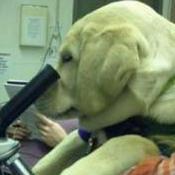-
Posts
44 -
Joined
-
Last visited
Profile Information
-
Application Season
2017 Fall
-
Program
Neuroscience
Recent Profile Visitors
1,808 profile views
aquamarine's Achievements

Caffeinated (3/10)
10
Reputation
-
 kyrDNa reacted to a post in a topic:
Required Courses
kyrDNa reacted to a post in a topic:
Required Courses
-
 celestial reacted to a post in a topic:
Ask questions about the PhD application process!
celestial reacted to a post in a topic:
Ask questions about the PhD application process!
-
Several PhD programs have a class that's kind of a "broad overview" of necessary topics. I'm in a pharmacology department and we have a course that's entirely cell biology and biochemistry- the reasoning for the class is that we have people coming in from all types of backgrounds (biochemistry, pure chemistry, chemical engineering, neuroscience, etc) and the class gets everyone onto similar footing. I wouldn't stress about it- the experience you would get doing the lab research is more valuable than the course.
-
So based on those two statements as an example, I feel like you could link them in a way that shows you're open-minded: "I'm interested in how different circumstances can result in genes triggering proto-oncogenes to become oncogenic. I've seen some recent research about how circumstance W causes gene X to trigger proto-oncogene Y to become oncogenic... and I think protein Z is a factor." (This might be better in an interview context instead of an SOP). For a SOP, the second one might be better, especially if there are multiple faculty at your schools of interest doing something along those lines. Not a perfect example, but you get the gist. I think @samman1994 has the right idea with his SOP right now. There's definitely a sweet spot between sounding like you've done enough research to have a mostly focused path in graduate school vs. being way too specific.
-
I spoke plenty about my specific topic of interest (neuropharmacology), while making it clear that I was in no way 100% committed to exactly what or how. The important thing that I might not have conveyed clearly enough is to show that you are open minded, especially with techniques. In the context of my interview, he was referring to interviewing with other students who essentially said "I am studying ONLY problem X using method Y with Prof Z". If your SOP/interview come off as too narrow, it is a detriment in your application.
-
Oh, I thought it was something I said and was very confused, lol. I can't speak for @Bioenchilada, but I would guess it has something to do with umbrella programs vs. direct-entry programs. That will play a role into the admissions process.
-
I'm not sure what you mean by this question.
-
I'd say the same, or at least close to it, of UNC.
-
1. Do those schools require an official copy? Some schools will accept the PDF you automatically receive from ETS. 2. Honestly, it sounds like you already have your mind made up about not applying and are seeking validation. I'll give it. I wouldn't apply there. One of the schools I interviewed at was the Indiana School of Medicine, and although they weren't a huge name school, their pharm/tox program funneled graduates into Lilly like nobody's business, because Lilly is headquartered in Indy. My program pushes graduates to look outside of academia, and have a pretty good track record placing into industry and other opportunities. If you look on each school's website, some post alumni and where they are now. (As an aside, my program's placement outside of academia is why I chose the school.) You might could also check department websites to see if they have a separate page for professional development things. My graduate school has a page with a ton of organizations, workshops, and professional development opportunities for both academia and other jobs.
-
 aquamarine reacted to a post in a topic:
2018 Applicant Profiles and Admissions Results
aquamarine reacted to a post in a topic:
2018 Applicant Profiles and Admissions Results
-
My school requires three; you have the option of a fourth (and even a fifth, but I feel like 5 is bordering ridiculous) if something doesn't work out in the first three. And I can definitely attest to having more than three people you're interested in. My program ended up with a larger class than usual and most of us have a sub-interest in neuropharmacology, so getting everyone situated into a rotation was a challenge. Additionally, some professors have a hard rule that they will only take one rotation student at a time. As for interviews, it varies per school. Most seemed to request a list of faculty that you'd be interested in meeting with. However, the list is a guideline and not a rule. I had one interview where I didn't interview with a single person I had asked for (weirdly, that interview weekend was a lot less stressful). Generally, you get your list ahead of your interview so you can prepare, but that isn't always hard and fast either. At one of my interviews, a professor got sick and the people scheduled to meet with him got shuffled around last minute. I wouldn't count on getting a week's preparation; two of my interviews gave us the list the night before. Some programs make sure you interview with at least one admissions committee member. It really depends on the school and you probably won't find out 100% how it works until you get the interview invite.
-
I mean zero disrespect, @samman1994, but from what I've read of your posts, you come off as very set in what you want to do and how you want to do it. I said it earlier and now that @TakeruK has said something similar, I'd like to give more unsolicited advice/anecdote regarding this. I interviewed with the director of my graduate program and I mentioned that even though I was most interested in behavioral neuroscience, I wanted to rotate in labs that gave me exposure to different techniques than what I'd done previously. He then spent 10 minutes of my interview talking about how he gets frustrated when graduate students come in with the idea that they will be sticking to previous techniques and research areas, because inevitably you will not end up doing what you thought you'd be doing even a semester into dissertation research. I would be very careful in how you phrase your previous techniques vs. what you think you'll be doing with your PhD in your personal statement - being viewed as closed-minded would be a huge detriment in your application.
-
 samman1994 reacted to a post in a topic:
How to email a lab you want to join
samman1994 reacted to a post in a topic:
How to email a lab you want to join
-
look up their current grants on the NIH Reporter website.
-
I am going to 110% back up what Eigen had to say on this post regarding what you would actually have to gain from this. Here is an anecdote, take from it what you will. My number one choice in professor at my current university is amazing. Incredible research, extremely personable, hard-working, you name it. I emailed the prof in April, when I was having trouble deciding between schools, asking if she had any spots available for rotations/permanent placement and she responded with a whole-hearted yes. I accepted my offer at the school and was extremely excited to have the opportunity to work with her. Something that was not mentioned in the emails (it wasn't something I thought to ask, and not something she was obligated in any way to bring up) is that I was most certainly not the only person interested in working with her, in fact, she is one of the most popular professors at my university. It is a borderline bloodbath to get a rotation in her lab. I did manage to secure a rotation, but she has at least 6 students rotating with her and only one spot for a permanent student (unless she gets more funding and can afford to take more than one). The moral of the story: just because emails go well early on does not mean that things will not change. 1) Research fit is not everything in a mentoring relationship. PhDs are about learning, and focusing on labs that use techniques you already have experience with won't get you very far. IMO, one of the most important things you can get out of your PhD is a good mentor. And what someone looks like on paper/grant sources/resources/email exchange, etc., might not be what you need in a mentor for your PhD. Many things play into how a lab functions- other lab personnel (are there a lot of other graduate students? how many post docs? what about research assistants and lab technicians?), your PIs relationship with the lab (Is he/she a micromanager, or so hands-off they don't even know you exist, or somewhere in the middle?), the lab's relationship with your program, etc. You've done research before; you know there is zero way to get a feel for it based off of emails. And although we'd like to pretend that the research is all that matters, the wrong work environment can destroy you. 2) Also, don't take this the wrong way, but professors aren't going to get super attached to you based on a few emails and/or an interview. I know I really struggled with that when I was rejecting the other schools I got into. Are you applying to programs that require you to have direct PI support from day 1, or are you applying to schools that require research rotations? If you do rotations, that brings me back to point #1 where mentorship > research fit. If you want my input for how I ended up at the school I did, or anything else regarding this insane process, feel free to PM me.
-
Same, and I got into 5 programs. None on that list (didn't apply to those schools), but it is possible.
-
In April, I reached out to a professor I am the most interested in and she told me that she generally takes students every year, and would be "delighted to host me in the fall". Is that a tentative commitment to being my first rotation mentor, or should I follow up in another email before the start of the semester? Or, should I hold off until the semester begins? Any advice?
-
I got into Indiana University's medical school Ph.D. program with a 3.47 GPA and a 70th percentile quant score. I also had a friend with similar statistics get into NYU's program. I don't know if that eases your mind or not, but IUSM at least seemed to not care very much about my GRE; no one even mentioned it in my interviews.



